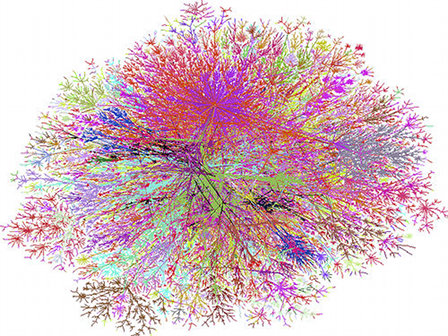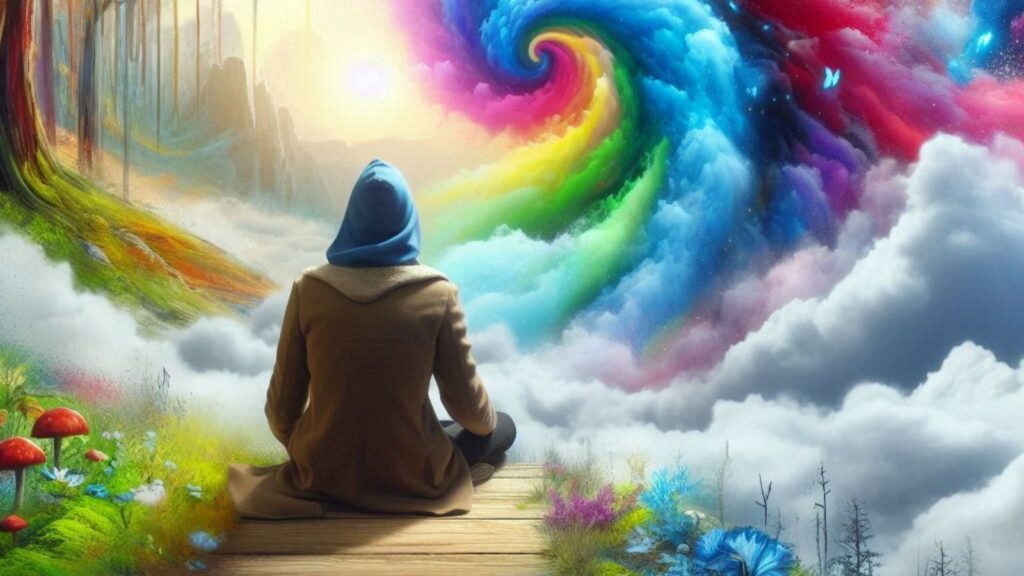Are your heartfelt attempts at being genuine, authentic and
intimate with other human beings, or even your self, being
dashed by addicts having conversations with invisible people?
Finding it hard to read 4 or 5 pages, let alone a whole novel,
unless it's something from the Young Adults genre? Well,
since the 1997 AOL sign-up boom, which was followed quickly by
the emergence of social networking websites, massive file
sharing, and high quality streaming video, a dialog has been
brewing from all participants, "Is the Internet playing with
our brains?" Recent studies and publications seem to be
tilting the meter from "likely" to an emphatic, screaming,
undeniable "YES!"
At the forefront of this discussion is Nicholas Carr's
recent book, The Shallows: What the Internet is doing
to our Brains. Carr points out that any advancement of
technology, but especially those of communication, have a
naturally occurring rewiring effect on thought and behavior.
Marshall MchLuhan, Neal Postman, and other popular
media-technology analysts anticipated this mass effect many
years ago, though few could've anticipated the computer would
go from being the size of a few school buses to fitting in
the corner of our pockets so quickly. The Internet and the
psychosocial dysfunctions that accompany it seem to have crept
up on us all like a psych-brain virus with a decade long
incubation cycle. Or, an incremental assault on thinking and
being.
We can now step into computer or gamer addiction support
groups the same way a drug addict does. "Digital Depression"
was identified some time ago by Dr. Peter Honey who noted,
"the profusion of communications technology (mobiles, email,
blueberries, wireless PDAs and laptops) are contributing to a
rise in employee stress levels, currently affecting 64% of the
working population," and that was back in 2003. Since then,
the landscape has been numbingly dotted by WI-FI, Android,
Internet televisions, and the advertising/social networking
behemoth Facebook, which, if ranked as a country, would be
listed as the world's third largest nation (also sporting a 14
billion dollar price tag). It's hard not to feel like an
insect in an expanding electronic colony.
Our very personalities, what defines us as who we are
(socially speaking), seem to be degenerating into a miniature
Internet, with no time allotted for reflection on just what it
is we actually are — what "holds" this experience of being
together. The persona itself has become a kind of hyperlinked
body, connecting to whatever the latest crap we lapped during
our last surf, or we drop into the bits in our personal meme
hall of fame when there happens to be an uncomfortable
silence.
A study from the International Center for Media and the
Public Agenda, "24 Hours: Unplugged," asked 200 students on
the campus to give up all media for a full day and blog on
private Web sites about their experience. Student reaction
showed addiction-like withdrawal symptoms such as anxiety,
misery, and being jittery, the authors wrote. It's no
surprise that conversation is also falling into an abyss of
flippant snark, data regurgitation, and monocultural babble
(enter Quagmire's "Giggidys" here) alongside the clockwork
like dialog dongs of "Umm," "Huh?" and "What happ'n?" So too
our relationship to the self as well as the outside world is
becoming a desperate realm of agitated ghosts. This is well
illustrated in the deeply unsettling documentary "We Live in
Public" which stands as a modern textbook account of the depth
of psychological unease and violence that can befall
individuals when they become the center-point of their own
24-hour CCTVed, digital utopia. Even Charles Manson pointed
out how grotesquely juvenile the consciousness of a culture is
that requires movies to see the obviousness of our shared
plight — "Avatar" anybody?
We now gobble food and relationships as carnivorously as we
gobble data — without stopping to actually taste, savor, enjoy,
and digest. We move on to the next brief satisfaction. The
public declaration of one's "availability" speaks something
nasty about who and what we assume relationships are: "…soft,
strong, and disposable," as Madeline Kahn said in "Clue."
It's getting to the point where one may wonder if Oscar Wilde
would have enough toner to finish printing the satire our
digital selves are worthy of.
In this swelling info-orgy more people from all walks of life
are finding it necessary to disconnect. Bill McKibben noted
that, "In the case of the so-called information society, it
may be the largest psychological experiment in history."
Arianna Huffington and Ellen Kunes, have drawn attention to
this problem with the "Unplug and Recharge Challenge." They
write, "We're addicted to our personal digital
assistants…Thankfully, we're both on the road to recovery."
Carr points out on his blog Rough Type, "James Sturm, the
cartoonist who has taken a four-month sabbatical from the
Internet, continues to write (and draw) about his experience
as one of The Disconnected." Outside of Sturm's welcomed
soldiering, another answer may lie in Maggie Jackson's
"Distracted: The Erosion of Attention and the Coming Dark Age,"
which closes with a chapter of her at a meditation retreat in
Colorado, through which she attempts to reclaim her
attention. It seems that alongside the Internet and the
kind of world culture that monetarism allows for — differential
advantage, Gulf Oil spill, political ego-worship, porn-driven
advertising, slavery and suffering — we are coming into a
few realizations, and the need for real active change on a
personally subjective and a socio-global level is needed now
more than ever. This is coming as we begin to realize that
our minds are not only being diabolically shaped through
language, media, social manipulation, technology, and
catastrophe, but also that we haven't
even "met" our own mind. As the band Salon of Refuse puts it,
we're far too busy with our "Faces to the screens."
The summer edition of Kalle Lasn's Adbusters, "The Whole Brain
Catalog," calls for a historic new movement, dubbed, "Mental
Environmentalism." The need for this new movement springs
from a disturbing prediction from the United Nations: "Mental
disease will be bigger than heart disease by 2020." Lasn's
article "Ecology of Mind: The Birth of a Movement," outlines
"an introduction to some of the mental pollutants, information
viruses and psychic shocks we have to deal with daily." This
invigorating article ends with a call to subjective arms. "As
more people trace their anxieties, mood disorders and
depression back to the toxins in our mental world, the first
murmurs of insurrection can be heard…we are witnessing the
birth pangs of the quintessential uprising of the 21st
century…What begins here today will be known as the
environmental movement of the mind."
NASA physicist Thomas Campbell's "My Big TOE: A Trilogy
Unifying Physics, Metaphysics, and Philosophy" is a worthy
handbook for this "Mental Environmentalism" movement, as it
not only derives quantum mechanics and general relativity, but
also opens the reader to the universe that is experiencing
this universe. Campbell's 900-page mind-expanding
slap-in-the-face offers one a kind of map of consciousness and
subjectivity — how to easily unload one's accrued mental baggage
and move deeper into one's own individual awareness to
discover, as he calls it "Big Truth." MBT also outlines the
logical, scientific measures an individual needs to take to
become a powerful, mobile vehicle in the deep oceans of
consciousness rather than a helpless life raft baking to death
on the surface.
Ways to break the digital compulsion besides the obvious (God
forbid) turning off the toys?
– Limit (or better yet cut off) caffeine and sugar intake.
Yes, it's heresy but we're metabolically attempting to
recreate 3G with this incessant chemical suckling. It's
thoroughly destroying our attention. This means folks will
have to read tiny labels.
– Attempt meditation formally, informally (naturally), or
through binaural beat audio technology — which will no doubt
become a hugely popular new drugless form of achieving deep
relaxation and profoundly wondrous altered states of
consciousness once the kids pick it up. Maybe try that
ancient Buddhist practice of sky gazing.
– Take heed from "Fight Club." Listen rather than sitting
there, pre-loading your turn to speak, like a butt sitting at
the thin end of a needle's prick.
– Look deeply into someone's eyes for an evening rather than a
screen.
– Talk to a stranger for no real reason — save for maybe the
fact that they are also another living corner of reality,
walking along the very same mystery that you are.
– Date a new person you didn't meet online.
– Live without going onto Google for a while — it blows the
mystery and ends the personal, subjective investigation. It's
the difference between looking at a field guide to North
American insects and digging in your own backyard to find out for yourself.
– For you readers, try Adyashanti, Jiddu Krishnamurti, and
Thomas Campbell; all these authors' works are dedicated to
un-programming the mind.
Internet addiction, digital lifestyles, living inside screens,
cultural programming, entertainment distractions, and the
constant flow of data maybe returning us to the deeply
relevant suggestion mentioned half a century ago, "Wouldn't
you love somebody to love" (other than yourself)? Mental
Environmentalists, start looking inwardly and outwardly, and
don't give up. The answer is already there, smiling.
Image by jurvetson, courtesy of Creative Commons license.











